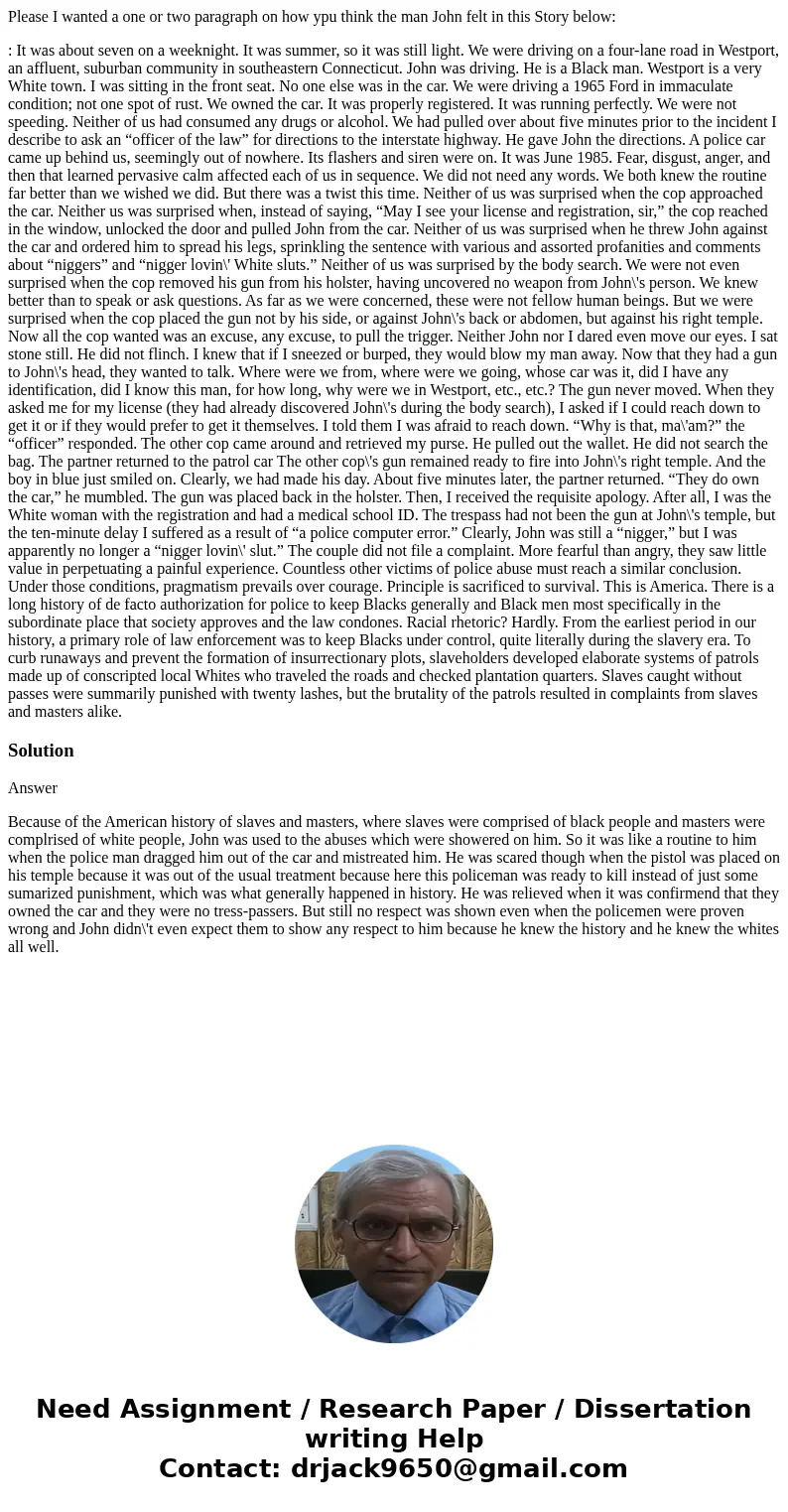Please I wanted a one or two paragraph on how ypu think the
Please I wanted a one or two paragraph on how ypu think the man John felt in this Story below:
: It was about seven on a weeknight. It was summer, so it was still light. We were driving on a four-lane road in Westport, an affluent, suburban community in southeastern Connecticut. John was driving. He is a Black man. Westport is a very White town. I was sitting in the front seat. No one else was in the car. We were driving a 1965 Ford in immaculate condition; not one spot of rust. We owned the car. It was properly registered. It was running perfectly. We were not speeding. Neither of us had consumed any drugs or alcohol. We had pulled over about five minutes prior to the incident I describe to ask an “officer of the law” for directions to the interstate highway. He gave John the directions. A police car came up behind us, seemingly out of nowhere. Its flashers and siren were on. It was June 1985. Fear, disgust, anger, and then that learned pervasive calm affected each of us in sequence. We did not need any words. We both knew the routine far better than we wished we did. But there was a twist this time. Neither of us was surprised when the cop approached the car. Neither us was surprised when, instead of saying, “May I see your license and registration, sir,” the cop reached in the window, unlocked the door and pulled John from the car. Neither of us was surprised when he threw John against the car and ordered him to spread his legs, sprinkling the sentence with various and assorted profanities and comments about “niggers” and “nigger lovin\' White sluts.” Neither of us was surprised by the body search. We were not even surprised when the cop removed his gun from his holster, having uncovered no weapon from John\'s person. We knew better than to speak or ask questions. As far as we were concerned, these were not fellow human beings. But we were surprised when the cop placed the gun not by his side, or against John\'s back or abdomen, but against his right temple. Now all the cop wanted was an excuse, any excuse, to pull the trigger. Neither John nor I dared even move our eyes. I sat stone still. He did not flinch. I knew that if I sneezed or burped, they would blow my man away. Now that they had a gun to John\'s head, they wanted to talk. Where were we from, where were we going, whose car was it, did I have any identification, did I know this man, for how long, why were we in Westport, etc., etc.? The gun never moved. When they asked me for my license (they had already discovered John\'s during the body search), I asked if I could reach down to get it or if they would prefer to get it themselves. I told them I was afraid to reach down. “Why is that, ma\'am?” the “officer” responded. The other cop came around and retrieved my purse. He pulled out the wallet. He did not search the bag. The partner returned to the patrol car The other cop\'s gun remained ready to fire into John\'s right temple. And the boy in blue just smiled on. Clearly, we had made his day. About five minutes later, the partner returned. “They do own the car,” he mumbled. The gun was placed back in the holster. Then, I received the requisite apology. After all, I was the White woman with the registration and had a medical school ID. The trespass had not been the gun at John\'s temple, but the ten-minute delay I suffered as a result of “a police computer error.” Clearly, John was still a “nigger,” but I was apparently no longer a “nigger lovin\' slut.” The couple did not file a complaint. More fearful than angry, they saw little value in perpetuating a painful experience. Countless other victims of police abuse must reach a similar conclusion. Under those conditions, pragmatism prevails over courage. Principle is sacrificed to survival. This is America. There is a long history of de facto authorization for police to keep Blacks generally and Black men most specifically in the subordinate place that society approves and the law condones. Racial rhetoric? Hardly. From the earliest period in our history, a primary role of law enforcement was to keep Blacks under control, quite literally during the slavery era. To curb runaways and prevent the formation of insurrectionary plots, slaveholders developed elaborate systems of patrols made up of conscripted local Whites who traveled the roads and checked plantation quarters. Slaves caught without passes were summarily punished with twenty lashes, but the brutality of the patrols resulted in complaints from slaves and masters alike.
Solution
Answer
Because of the American history of slaves and masters, where slaves were comprised of black people and masters were complrised of white people, John was used to the abuses which were showered on him. So it was like a routine to him when the police man dragged him out of the car and mistreated him. He was scared though when the pistol was placed on his temple because it was out of the usual treatment because here this policeman was ready to kill instead of just some sumarized punishment, which was what generally happened in history. He was relieved when it was confirmend that they owned the car and they were no tress-passers. But still no respect was shown even when the policemen were proven wrong and John didn\'t even expect them to show any respect to him because he knew the history and he knew the whites all well.

 Homework Sourse
Homework Sourse